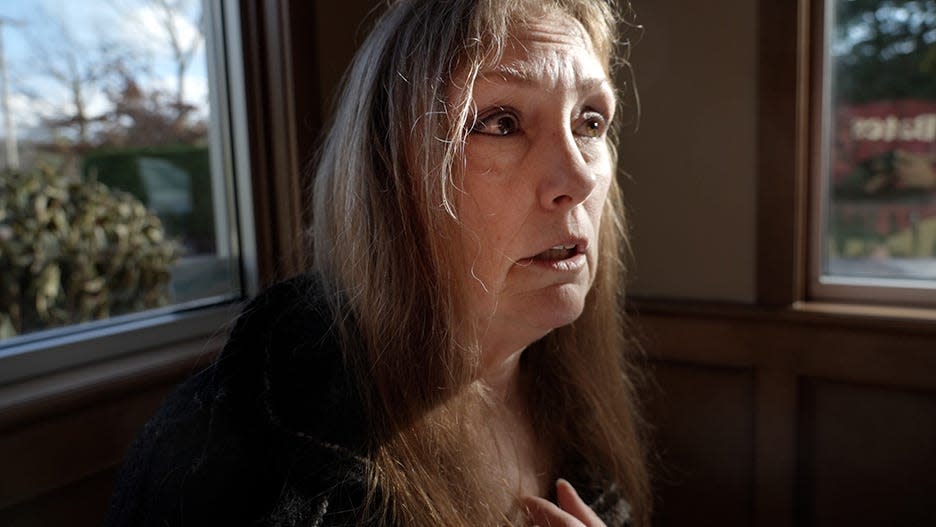Mandatory minimum sentencing for sexual assault bill approved in House. Why did opponents try to kill it?
PROVIDENCE – Despite an eleventh-hour campaign by opponents of mandatory minimum sentences, the House on Wednesday approved a bill dubbed "Sherry's Law" - in honor of one of their own who has publicly recounted the physical, emotional and sexual abuse she suffered as a child at the hands of her stepfather.
After evading justice for decades, Rep. Sherry Roberts' stepfather - Harry N. Edwards - was arrested in February 2021 and charged with first degree sexual assault. He pleaded guilty to a lesser charge of second degree sexual assault and received a 10-year suspended sentence, avoiding prison as long as he keeps a clean record.
Roberts bill - approved on a 52-to-15 House vote Wednesday, after an emotional hour-long debate - would mandate a minimum of 10 years in prison for first-degree sexual assault, and a minimum of five years for second-degree sexual assault, which may involve inappropriate sexual contact without penetration.
(Other offenses, such as statutory rape, fall under the charge of third degree sexual assault and are not included in the bill.)
Ahead of the vote, groups ranging from the ACLU to BLM RI joined a former public defender and a dean at the Roger Williams University School of law in a campaign to try to convince legislators to kill the bill.
They argued against. "a return to the failed, extreme policies of ‘tough on crime’ mandatory minimum prison sentences of the past."

Mandatory minimum sentencing draws criticism
Among their arguments: "Severe mandatory minimum sentences have been proven to be part of the disastrous system of mass incarceration of the last five decades."
"This extreme bill, possibly the most severe in the nation, will similarly result in the same excessive punishments, a ballooning state-wide reliance on prisons, and will ultimately fall disproportionately on low income communities and communities of color."
They also warned, the "massive increase in prison sentences for sexual assault'' could discourage victims from coming forward" and reporting assailants who may be family members or partners. And alternatively, it may ultimately push up prison costs by putting more people in prison, longer.
"Under this new law,'' they warned, "nuances would disappear. A jury... instructed to follow the letter ofthe criminal code, would very likely have to sentence a defendant to a five year prison sentence for hitting a victim on the buttocks by surprise."
Rep. Matthew Dawson, a former state prosecutor, echoed those arguments on the House floor and raised the concern, that without judicial discretion, someone who "just touches someone's backside in a barroom or something of this nature" could land in prison for five years.
"You could stab somebody, get less than five years to serve," said Dawson, D-East Providence.
Rep. Enrique Sanchez, D-Providence, voiced his concern: "This targets poor working class people. I'm not saying just Black and Latino people, but also every working community across the state... nd that's where the bigger picture is for me... We're criminalizing people who may not have been committing a crime."
But advocates for the bill drew the line between over-zealous prosecutions during the "War on Drugs" that hit some populations more than others and the imprisonment of rapists.
"if you don't want the consequences, then don't do the violent crime," said Rep. Barbara Ann Fenton-Fung,R-Cranston.
"This is first degree sexual assault. This is someone coming into your room, breaking into your house and raping you. This is violent. This is not somebody who should be sitting next to you in the restaurant.," she said. "I've heard so many eloquent statements about how this might be unfair to the person who rapes the woman. I'm just not... all that sympathetic to them."
"There's a way to avoid this and it's [to] keep your hands to yourself," echoed Rep. Justine Caldwell, D-East Greenwich. .
"We heard mandatory minimums don't work. Don't work at what?" said House Minority Leader Michael Chippendale. "It's working to keep that rapist from raping someone for 10 years."
"We [also] heard that people don't even get this kind of time for stabb[ing someone]. I will confess on the record that I would much rather be stabbed than raped," he said.
"Let's put this into the human context," Chippendale, R-Foster, argued. "Let's take off the lawyer hats and let's do this as humans. Please do the right thing on this."
"Your child, your sister, your mother, your grandmother, your neighbor. It's going to go on and on. When do we put our foot down and protect the people who elected us... and say, no, you are not going to commit these crimes and walk away,"' said Rep. Charlene Lima, D-Cranston.
"Roberts' perpetrator who admitted it, walked away with no jail time," she noted.
In her own turn, Roberts' repeated in so many words what she said last week to the House Judiciary Committee: "There are some people here concerned about this minimum five years. I just want to remind people that when you are a victim, you get a life sentence … It caused permanent damage to my life."
"This was not a mere allegation of touching," she told colleagues Wednesday night. "It was...proven long-term violent abuse and my abuser admitted to it. Yet the offender initially charged with first degree sex assault easily got his charge reduced. Escape[d] jail time. Zero consequences."
But "this isn't about me. I stand gain absolutely nothing. It's too late for me. My case is closed. I am hopeful though that my experience can help you understand the why and the how [for] the other victims that we have a responsibility to help."
The legislation now goes to the Senate, where its fate is uncertain in the final weeks of this year's legislative session.
This article originally appeared on The Providence Journal: RI General Assembly to vote on mandatory minimum sentencing for sexual assault

